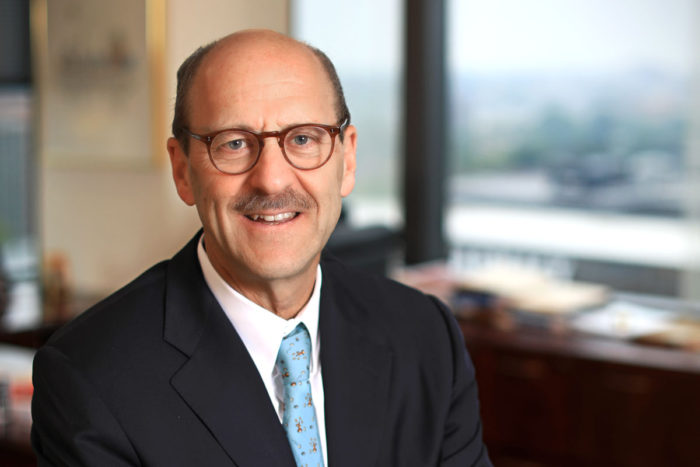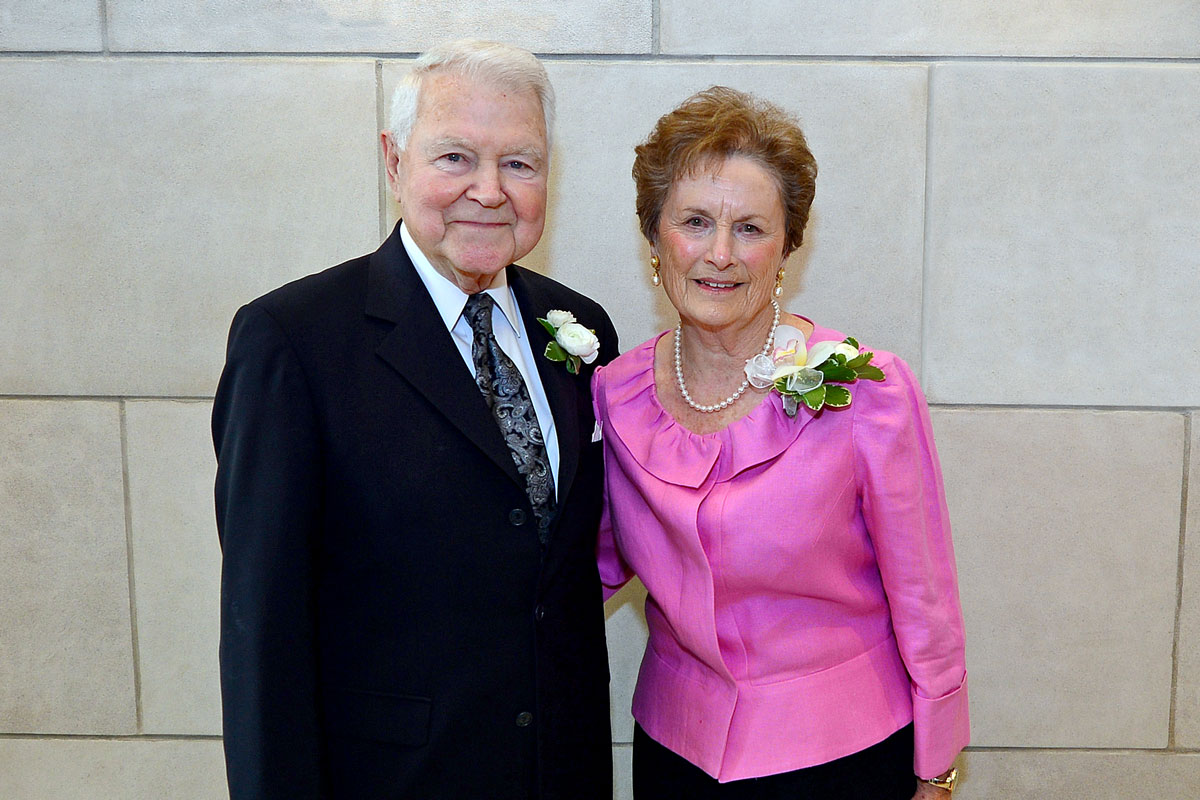Bauer gift establishes named deanship at School of Medicine
David H. Perlmutter, MD, is inaugural George and Carol Bauer Dean
 James Byard
James ByardA gift from philanthropists George and Carol Bauer to Washington University in St. Louis establishes a named deanship for the School of Medicine. David H. Perlmutter, MD, dean since 2015, is the inaugural George and Carol Bauer Dean of the School of Medicine. He also is the Spencer T. and Ann W. Olin Distinguished Professor and executive vice chancellor for medical affairs.
A $5 million gift from philanthropists George and Carol Bauer to Washington University in St. Louis establishes a named deanship for the School of Medicine. This deanship recognizes and perpetuates the distinguished leadership of the school’s previous deans. Their collective vision and influence are credited with the school’s preeminent stature and with paving the way for its future successes.
The Bauers’ gift is one of many given to the university by the couple over the years. It provides an endowment that will support the current dean and his successors to advance scholarship, leading-edge discovery, entrepreneurial programs, and strategic projects aimed at improving human health.
David H. Perlmutter, MD, dean since 2015, is the inaugural George and Carol Bauer Dean of the School of Medicine. He also is the Spencer T. and Ann W. Olin Distinguished Professor and executive vice chancellor for medical affairs.
The deanship was announced by Chancellor Mark S. Wrighton. “I am grateful to George and Carol Bauer for their continuing, enthusiastic support and commitment to Washington University,” Wrighton said. “The Bauers have endowed scholarships for students, a professorship for faculty, the George and Carol Bauer Leadership Center at the Olin Business School, and now this deanship at the School of Medicine. They are wonderful advocates for Washington University, and their extraordinary generosity will help the university prosper for generations to come.”
Perlmutter is a national leader with more than 30 years of experience in academic medicine. His installation ceremony as the George and Carol Bauer Dean will include a lecture on his vision for the medical school’s future, with an emphasis on its personalized medicine initiative to revolutionize medical research and patient care.
“It is deeply humbling to be named the George and Carol Bauer Dean and a great honor to be a part of this university and medical school, which has had such a long history as a leader in medical education, biomedical research and health care,” Perlmutter said. “The school continues to be home to some of the most influential physicians and scientists in the world. I am so grateful to the Bauers and the university for this endowment, which will support the School of Medicine’s most important priorities in the areas of scientific discovery, translating those discoveries into clinical treatments, and finding far-reaching ways to get effective therapies to those who need them, in St. Louis and around the world.”
Perlmutter is internationally recognized for his research on alpha-1 antitrypsin deficiency (ATD), a genetic disorder. The condition involves a misfolded protein that can cause severe liver damage. His work has led to advances in understanding how cells dispose of misfolded proteins that are toxic and cause cellular dysfunction.
To evaluate potential treatments for ATD, he and colleagues developed a pipeline of drugs that includes one in phase two trials. The goal is to eliminate the need for liver transplantation, the only treatment option for patients with progressive liver disease due to ATD.
Drugs in this pipeline target and enhance a cellular degradation pathway known as autophagy, which is critical for the functioning of all cells. Because the decline in the function of the pathway during aging has been linked to degenerative diseases, these drugs represent exciting candidates for prevention of cognitive decline and other degenerative diseases of aging. Some of the candidate drugs are already FDA-approved for other indications, allowing this work to move into clinical trials much more rapidly, perhaps even within five to seven years. Perlmutter and his collaborators also recently discovered that a drug used for Type 2 diabetes may enhance autophagic degradation of misfolded proteins.
Perlmutter was trained at Children’s Hospital of Philadelphia and Boston Children’s Hospital and has been on the faculties of Harvard Medical School, University of Pittsburgh and Washington University. Prior to his appointment in 2015 as Washington University’s executive vice chancellor for medical affairs and dean, he was a distinguished professor and the Vira I. Heinz Endowed Chair of the Department of Pediatrics at the University of Pittsburgh, as well as physician-in-chief and scientific director of the Children’s Hospital of Pittsburgh of the University of Pittsburgh Medical Center.
Perlmutter is a newly elected member of the American Academy of Arts and Sciences, a member of the National Academy of Medicine, chair of the Medical Sciences Section of the American Association for the Advancement of Science, past president of the Society for Pediatric Research and a past member of the Advisory Council of the National Institute of Diabetes and Digestive and Kidney Diseases. He has been honored with numerous awards throughout his career, including the E. Mead Johnson Award for Research in Pediatrics from the American Pediatric Society, and the Sass-Kortsak Award for Pediatric Liver Research from the Canadian Liver Association. He has authored more than 200 scientific publications and holds nine U.S. patents or patent applications.
 James Byard
James ByardGeorge and Carol Bauer
Originally from DeSoto, Mo., George Bauer is an emeritus trustee and alumnus of Washington University. He earned his bachelor’s degree in 1953 and his master’s degree in 1959 from the School of Engineering & Applied Science.
From there, he embarked on a career with IBM, where he served in a variety of leadership positions in marketing, finance and business systems. When he retired in 1987, Bauer founded an investment banking firm, the GPB Group Ltd.
Carol Bauer is involved in many philanthropic activities in Wilton, Conn., where the Bauers live. She also has contributed extensively to Norwalk Hospital in Norwalk, Conn., where she is a former chairperson of the board of trustees, the founder and leader of the hospital’s ER Reception Volunteers, and a hospital chaplain. In 2012, she was recognized for that work with the Connecticut Hospital Association’s Health Care Hero Award. Carol has served for almost 20 years on the board of the AmeriCares Foundation, an international humanitarian/health-care organization.
George Bauer has served as treasurer of the board of trustees for Norwalk Hospital and currently is a member of the board of directors for the Norwalk Hospital Association and Western Connecticut Health Network.
The Bauers are longtime Washington University benefactors, providing scholarships for students and, in 2004, establishing an endowment to provide emergency financial aid to students experiencing unforeseen financial problems.
They established the George and Carol Bauer Professorship in Organizational Ethics and Governance in 2007. In 2011, the Bauer Foundation made a gift of $10 million to provide capital support for the Olin Business School’s Bauer Hall, which opened in 2014. Two years later, another $5 million gift from the Bauers helped establish the George and Carol Bauer Leadership Center at Olin.
“It’s a privilege to support an institution like Washington University, which has a long history of exceptional leadership,” Carol Bauer said. “We know the resources we provide through our gifts will be put to good use.”
George Bauer added, “Carol and I are deeply involved with health-care organizations in our community, and we are pleased to be able to extend our reach with this gift, which will help Dean Perlmutter and future deans develop talented young physicians and scientists and move research discoveries into the clinical realm.”
George Bauer also serves on Washington University’s New York Regional Cabinet and Olin’s National Council. In 2009, the School of Engineering & Applied Science honored him with a Distinguished Engineering Award.
In 2011, the couple received the Robert S. Brookings Award in recognition of their extraordinary generosity and commitment to the university. They received the Olin Dean’s Medal in 2012 and were honored with the New York Regional Award in 2018 for their outstanding professional achievement and service to the university.






